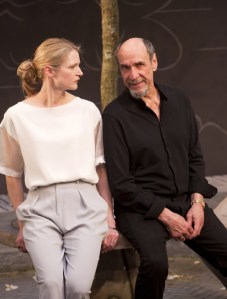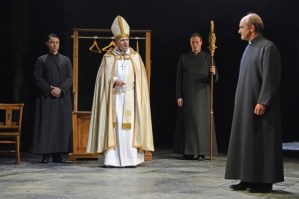Review: The Lady in the Van (Theatre Royal Bath)
Alan Bennett’s classic is revived to conclude Jonathan Church’s first season at the theatre
Fact is often stranger than fiction. In the late '60s, Miss Shepherd, a women of no fixed abode, rocked up in the front garden of Alan Bennett‘s Camden residency and made herself right at home. For close to two decades – up until Miss Shepherd's death in 1989 – one of Britain’s foremost playwrights was forced to live cheek by jowl next to one of Britain’s smelliest citizens.
If Miss Shepherd felt she deserved to be on the same pedestal of fame as Bennett in life, his 1999 play gives her something of a eulogy in remembrance. Originally portrayed by Dame Maggie Smith both on stage and in the solid film adaptation, Miss Shepherd is a cracking role for performers of a certain vintage, often starved of opportunity. Not many performers can slug it out toe-to-toe with memories of Smith’s take and come out with a draw, but then, there are few performers like Sara Kestelman, bringing her own breed of heavyweight quality to the role. If she is less mischievously impish than Smith, what she carefully essays is that through all the bluster there is a more delicate heart beating underneath, hiding a lifetime of pain and mental instability by honing a tough exterior that to the end is never cracked. Only as she begins to discuss her musical past does the shell rise a little and we see her eyes light up at past remembered joys, pleasure she now denies herself for reasons not revealed until its final epilogue. For all her downtrodden attacks, it is difficult not to warm to her as you expect Bennett did himself.
In this production that would be 'Bennett' plural as the writer has put himself on stage not once but twice. Looking back at events from his writing desk, James Northcote discusses and elucidates on the thoughts of Sam Alexander’s in-the-moment take, as he connects with his unexpected neighbour. If the former is more convincing than the latter in catching Bennett’s particular vocal cadences and elongated Yorkshire vowels, both manage, in the end, to turn the role into something more than caricature. Bennett is often unfairly maligned as something soft, a Sunday evening writer of gentle and whimsical Northern humour, a theatrical equivalent of Last Of The Summer Wine, yet there is plenty more bite than that. He is forensic in his eye for detail, the descriptions of the turds that he encounters outside the van make the audience audibly groan in unison, while the angry diatribe he at one point throws at Miss Shepherd suggests a man not as nice as he is often portrayed, but just too timid to encounter conflict.
Although the work across the ensemble is sometimes uneven, there is fine supporting performances from the always reliable William Gaunt as a roguish vagabond and Cat Simmonds as a bluff social worker taking Bennett to task. Dominating the stage in Robert Innes Hopkins' set is the titular van, a garish yellow monstrosity that took pride of place for decades on the corner of Camden and Primrose Hill. Towards the end it ascends towards the rafter, a symbolic goodbye to a defining period in Alan’s life that began with him as a still upcoming playwright and ended with him as a national treasure.
Jonathan Church marshals the well-drilled action, ensuring a constant forward momentum, in what is a solid climax to his first season in charge. If he can continue combine the expected diet of Britain’s best loved playwrights, including Hare and Bennett, with one or two pieces that challenge its audience more, don’t be surprised if he turns Theatre Royal Bath into a national destination in its own right, not just a playhouse for the city's residents.
The Lady in the Van runs at Theatre Royal Bath until 2 September.















